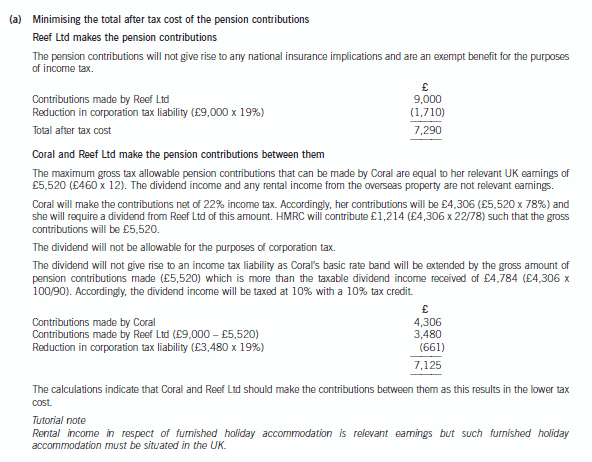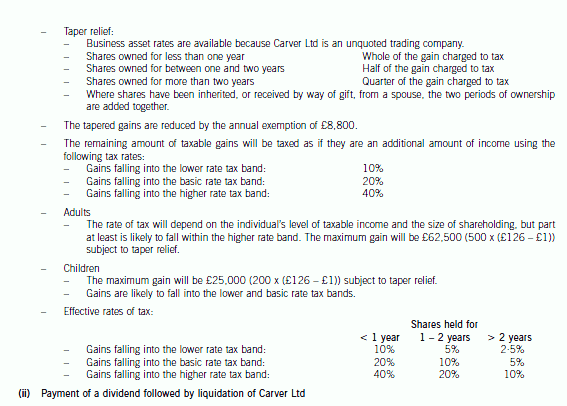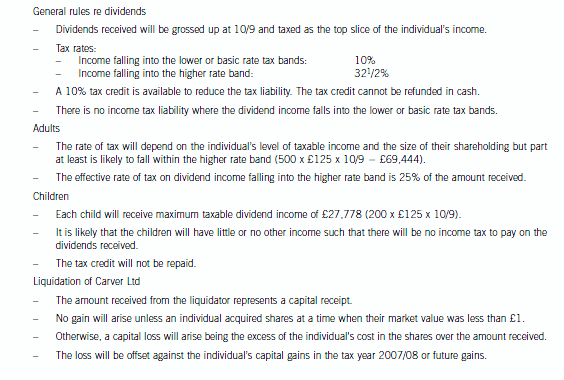你一定要看的ACCA考试必备的四种心态详情!
发布时间:2020-04-09
如何能在ACCA的考试中做到保持良好的心态,从容应对考试,对所有ACCA考生来说都是一个挑战。ACCA考如高考,不但需要知识点的支撑,也需要劳逸结合、适当休息,坚持下来你就胜利了。51题库考试学习网为考生们分享一下备考ACCA考试的四种必备心态!
一、恒定心
无论在备考中还是考试时遇到何种困难,一定要坚持下去。
二、吃苦心
不经历风雨怎么见彩虹,没有人能随随便便成功,既然选择了考试的道路,就要作好吃苦的准备,无论怎样辛苦,为了以后能更幸福的生活,一定要先吃苦,“吃得苦中苦方为人上人”,切记。
三、喜悦心
痛苦着去学习不如快乐着去学习,学习是快乐的、是愉悦的。请各位考生每天都要保持一颗愉快的心情,早上起来说的第一句话是“今天真是个好天气,我今天心情真好!”。
四、自信心
经常告诉自己我要成功,我一定会成功的!遇到难题的时候最好告诉自己我一定会把难题攻克的,我一定会战胜困难的。考生在考前复习阶段,往往会产生焦躁不安,心绪不宁,信心不足,担心忧虑等等不良的心理状况。所以请各位考生要不断的自我提示,“不计得失只讲过程,享受过程是快乐的”,考生不能总是患得患失,复习到最后了,考生的任务就是全力去考试,其它的事情与我无关,保持这样的良好心态一直到考试结束,就胜利了!
对于备考ACCA的考生朋友们,复习的安排应该劳逸结合,养成规律的生活习惯,每天安排一定的时间锻炼身体,放松自己,选择一些适合自己的运动方式,不仅可以愉悦身心,而且可以增强体质,有助于我们保持一个强劲的竞争优势积极迎考。要对自己的复习有信心,胜利属于有充分准备的人,不要给自己施加太大的压力。在考试期间要抛开一切杂念,考完一门后就不用去想其结果,而是调整心情考虑如何应对下一门,直到考试科目全部结束。如果能做到如此,坚持到最后,相信会得到一个满意的结果。
今日分享时间到此结束,如果你们觉得意犹未尽,还想了解更多内容的话,建议你们去51题库考试学习网的官网看看。
下面小编为大家准备了 ACCA考试 的相关考题,供大家学习参考。
Required:
Discuss the principles and practices which should be used in the financial year to 30 November 2008 to account
for:(b) the costs incurred in extending the network; (7 marks)
Costs incurred in extending network
The cost of an item of property, plant and equipment should be recognised when
(i) it is probable that future economic benefits associated with the item will flow to the entity, and
(ii) the cost of the item can be measured reliably (IAS16, ‘Property, plant and equipment’ (PPE))
It is necessary to assess the degree of certainty attaching to the flow of economic benefits and the basis of the evidence available
at the time of initial recognition. The cost incurred during the initial feasibility study ($250,000) should be expensed as incurred,
as the flow of economic benefits to Johan as a result of the study would have been uncertain.
IAS16 states that the cost of an item of PPE comprises amongst other costs, directly attributable costs of bringing the asset to the
location and condition necessary for it to be capable of operating in a manner intended by management (IAS16, para 16).
Examples of costs given in IAS16 are site preparation costs, and installation and assembly costs. The selection of the base station
site is critical for the optimal operation of the network and is part of the process of bringing the network assets to a working
condition. Thus the costs incurred by engaging a consultant ($50,000) to find an optimal site can be capitalised as it is part of
the cost of constructing the network and depreciated accordingly as planning permission has been obtained.
Under IAS17, ‘Leases’, a lease is defined as an agreement whereby the lessor conveys to the lessee, in return for a payment or
series of payments, the right to use an asset for an agreed period of time. A finance lease is a lease that transfers substantially all
the risks and rewards incidental to ownership of the leased asset to the lessee. An operating lease is a lease other than a finance
lease. In the case of the contract regarding the land, there is no ownership transfer and the term is not for the major part of the
asset’s life as it is land which has an indefinite economic life. Thus substantially all of the risks and rewards incidental to ownership
have not been transferred. The contract should be treated, therefore, as an operating lease. The payment of $300,000 should be
treated as a prepayment in the statement of financial position and charged to the income statement over the life of the contract on
the straight line basis. The monthly payments will be expensed and no value placed on the lease contract in the statement of
financial position
4 Coral is the owner and managing director of Reef Ltd. She is considering the manner in which she will make her first
pension contributions. In November 2007 she inherited her mother’s house in the country of Kalania.
The following information has been extracted from client files and from telephone conversations with Coral.
Coral:
– 1972 – Born in the country of Kalania. Her father, who died in 2002, was domiciled in Kalania.
– 1999 – Moved to the UK and has lived and worked here since then.
– 2001 – Subscribed for 100% of the ordinary share capital of Reef Ltd.
– Intends to sell Reef Ltd and return to live in the country of Kalania in 2012.
– No income apart from that received from Reef Ltd.
Reef Ltd:
– A UK resident company with annual profits chargeable to corporation tax of approximately £70,000.
– Four employees including Coral.
– Provides scuba diving lessons to members of the public.
Payments from Reef Ltd to Coral in 2007/08:
– Director’s fees of £460 per month.
– Dividends paid of £14,250 in June 2007 and £14,250 in September 2007.
Pension contributions:
– Coral has not so far made any pension contributions in the tax year 2007/08 but wishes to make gross pension
contributions of £9,000.
– The contributions are to be made by Reef Ltd or Coral or a combination of the two in such a way as to minimise
the total after tax cost.
– Any contributions made by Coral will be funded by an additional dividend from Reef Ltd.
House in the country of Kalania:
– Beachfront property with potential rental income of £550 per month after deduction of allowable expenditure.
– Coral will use it for holidays for two months each year.
The tax system in the country of Kalania:
– No capital gains tax or inheritance tax.
– Income tax at 8% on income arising in the country of Kalania.
– No double tax treaty with the UK.
Required:
(a) With the objective of minimising the total after tax cost, advise Coral as to whether the gross pension
contributions of £9,000 should be made:
– wholly by Reef Ltd; or
– by Coral to the extent that they are tax allowable with the balance made by Reef Ltd.
Your answer should include supporting calculations where necessary. (9 marks)

(iii) The effect of the restructuring on the group’s ability to recover directly and non-directly attributable input
tax. (6 marks)
You are required to prepare calculations in respect of part (ii) only of this part of this question.
Note: – You should assume that the corporation tax rates and allowances for the financial year 2006 apply
throughout this question.
(iii) The effect of the restructuring on the group’s ability to recover its input tax
Prior to the restructuring
Rapier Ltd and Switch Ltd make wholly standard rated supplies and are in a position to recover all of their input tax
other than that which is specifically blocked. Dirk Ltd and Flick Ltd are unable to register for VAT as they do not make
taxable supplies. Accordingly, they cannot recover any of their input tax.
Following the restructuring
Rapier Ltd will be carrying on four separate trades, two of which involve the making of exempt supplies such that it will
be a partially exempt trader. Its recoverable input tax will be calculated as follows.
– Input tax in respect of inputs wholly attributable to taxable supplies is recoverable.
– Input tax in respect of inputs wholly attributable to exempt supplies cannot be recovered (subject to the de minimis
limits below).
– A proportion of the company’s residual input tax, i.e. input tax in respect of inputs which cannot be directly
attributed to particular supplies, is recoverable. The proportion is taxable supplies (VAT exclusive) divided by total
supplies (VAT exclusive). This proportion is rounded up to the nearest whole percentage where total residual input
tax is no more than £400,000 per quarter.
The balance of the residual input tax cannot be recovered (subject to the de minimis limits below).
– If the de minimis limits are satisfied, Rapier Ltd will be able to recover all of its input tax (other than that which is
specifically blocked) including that which relates to exempt supplies. The de minimis limits are satisfied where the
irrecoverable input tax:
– is less than or equal to £625 per month on average; and
– is less than or equal to 50% of total input tax.
The impact of the restructuring on the group’s ability to recover its input tax will depend on the level of supplies made
by the different businesses and the amounts of input tax involved. The restructuring could result in the group being able
to recover all of its input tax (if the de minimis limits are satisfied). Alternatively the amount of irrecoverable input tax
may be more or less than the amounts which cannot be recovered by Dirk Ltd and Flick Ltd under the existing group
structure.

(b) The directors of Carver Ltd are aware that some of the company’s shareholders want to realise the value in their
shares immediately. Accordingly, instead of investing in the office building or the share portfolio they are
considering two alternative strategies whereby, following the sale of the company’s business, a payment will be
made to the company’s shareholders.
(i) Liquidate the company. The payment by the liquidator would be £126 per share.
(ii) The payment of a dividend of £125 per share following which a liquidator will be appointed. The payment
by the liquidator to the shareholders would then be £1 per share.
The company originally issued 20,000 £1 ordinary shares at par value to 19 members of the Cutler family.
Following a number of gifts and inheritances there are now 41 shareholders, all of whom are family members.
The directors have asked you to attend a meeting to set out the tax implications of these two alternative strategies
for each of the two main groups of shareholders: adults with shareholdings of more than 500 shares and children
with shareholdings of 200 shares or less.
Required:
Prepare notes explaining:
– the amount chargeable to tax; and
– the rates of tax that will apply
in respect of each of the two strategies for each of the two groups of shareholders ready for your meeting
with the directors of Carver Ltd. You should assume that none of the shareholders will have any capital
losses either in the tax year 2007/08 or brought forward as at 5 April 2007. (10 marks)
Note:
You should assume that the rates and allowances for the tax year 2006/07 will continue to apply for the
foreseeable future.



声明:本文内容由互联网用户自发贡献自行上传,本网站不拥有所有权,未作人工编辑处理,也不承担相关法律责任。如果您发现有涉嫌版权的内容,欢迎发送邮件至:contact@51tk.com 进行举报,并提供相关证据,工作人员会在5个工作日内联系你,一经查实,本站将立刻删除涉嫌侵权内容。
- 2020-01-10
- 2021-08-12
- 2020-01-29
- 2020-05-02
- 2020-01-10
- 2021-06-03
- 2020-01-10
- 2020-08-15
- 2020-03-03
- 2020-01-10
- 2020-05-09
- 2020-05-08
- 2020-01-10
- 2021-05-08
- 2020-01-15
- 2021-07-28
- 2020-01-09
- 2021-08-08
- 2020-01-10
- 2021-04-24
- 2020-01-01
- 2020-01-10
- 2020-01-10
- 2020-04-29
- 2019-11-27
- 2020-01-09
- 2020-01-09
- 2020-01-10
- 2020-04-30
- 2020-04-19